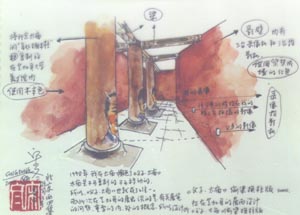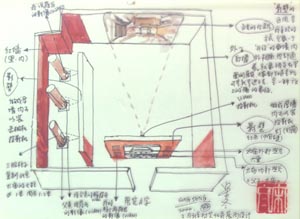Smart Museum exhibition will be ‘Canceled’
Arthur FournierNews Office
Since the end of the Cultural Revolution in 1976, the Chinese government has significantly relaxed its control over matters of culture. Hollywood films and Western-style television programs are now popular forms of entertainment, and more adventurous forms of art and literature are beginning to attract new audiences. But even as Chinese artists find themselves free to address a wider range of subject matter and to experiment formally, some attempts to exhibit provocative work still meet with obstruction.
 The hand-drawings above and below depict Wu Hung’s layout of the exhibition “Canceled.” |
Both thematically and formally, “Canceled” is unconventional. Rather than focusing on the work of a particular artist or artistic group, curator Wu Hung has designed a tightly focused installation that stands in dialogue with events that surrounded an unrealized exhibition. Visitors to “Canceled” will have an opportunity to rediscover curator Leng Lin’s 1998 exhibition of experimental art “It’s Me,” which Chinese officials canceled just prior to its opening at the former Imperial Ancestral Temple.
In its Richard and Mary L. Gray Gallery, the Smart Museum will display work by visual artist Song Dong drawn from Leng Lin’s exhibition paired with Wu Wenguang’s documentary Diary: Snow, November 21, 1998, a video about public reaction to the abrupt closure of “It’s Me.”
Wu Hung, the Harrie A. Vanderstappen Distinguished Service Professor in Art History, explained that the design of the installation and its accompanying catalog, published by the Smart Museum, raises concerns that are crucial to a proper understanding of experimental art in present-day China.
“Generally speaking, China in 2000 is no longer a socialist monolith, but a huge mixture of old and new, feudal and postmodern, excitement and anxiety,” Wu explained. “The country’s future depends on the outcome of the negotiation between these conflicting social forces.”
It is precisely because they are aware of this dynamic process of change that many experimental artists in China have begun to focus on exhibiting their works in openly accessible public spaces. “The dominant choice in 1999 and 2000 has been to ‘go public,’” Wu said. “Advocates of this approach hope that by finding new channels to bring experimental art into the public sphere, they can undermine the prohibitions imposed by the government.”
“It’s Me” is only one of more than 10 exhibitions of experimental art in Beijing to have been canceled over the past three years. Government officials closed some of these shows, but in other cases, the curators themselves or museum personnel chose not to exhibit works because of a sense they might be deemed too controversial.
 |
Kimerly Rorschach, the Dana Feitler Director of the Smart Museum, who worked with Wu to realize plans for “Canceled,” said she believes the exhibition poses challenges for American art audiences. She pointed to public furor over the Brooklyn Museum of Art’s “Sensation” exhibition last year as an indication that the status of experimental art in the United States is still very much at issue.
“The “Sensation” controversy and its aftermath, which has caused many museums exhibiting contemporary art to reexamine the way they do business, reminds us that, in this country, we labor under constraints that are different, but no less real, than those operating in China,” explained Rorschach.
Prior to “Canceled,” Wu and Rorschach collaborated once before to bring Chinese contemporary art to the University. In 1999, the Smart Museum exhibited “Transience: Chinese Experimental Art at the End of the Twentieth Century.”
“We are proud to be able to continue to support Wu Hung’s efforts to make contemporary Chinese art better known, in its Chinese context, in the West,” said Rorschach.
“Canceled: Exhibiting Experimental Art in China,” will be on view at the Smart Museum through Sunday, Jan. 7, 2001. In addition to the opening reception, presentations by Song Dong, Wu Wenguang and Leng Lin are scheduled to take place in conjunction with the exhibition.
The Smart Museum is at 5550 S. Greenwood Ave., and is open from 10 a.m. to 4 p.m. on Tuesdays, Wednesdays and Fridays; 10 a.m. until 9 p.m. on Thursdays; and from noon until 6 p.m. on Saturdays and Sundays. The galleries are closed on Mondays. For more information, call (773) 702-0200, or visit http://smartmuseum.uchicago.edu.
![[Chronicle]](/images/small-header.gif)